P.J. Blu-ray Movie
HomeP.J. Blu-ray Movie 
Imprint | 1968 | 109 min | Not rated | No Release Date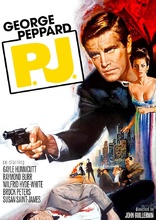
Price
Movie rating
7 | / 10 |
Blu-ray rating
| Users | 0.0 | |
| Reviewer | 4.0 | |
| Overall | 4.0 |
Overview
P.J. (1968)
Down-on-his-luck private investigator P.J. Detweiler is hired by a wealthy businessman to protect his mistress from whomever is sending her death threats. But when P.J. winds up killing his new boss's business partner, he suspects that he was hired to act as a tool for murder.
Starring: George Peppard, Raymond Burr, Gayle Hunnicutt, Brock Peters, Wilfrid Hyde-WhiteDirector: John Guillermin
| Crime | Uncertain |
| Drama | Uncertain |
| Action | Uncertain |
| Mystery | Uncertain |
Specifications
Video
Video codec: MPEG-4 AVC
Video resolution: 1080p
Aspect ratio: 2.35:1
Original aspect ratio: 2.35:1
Audio
English: LPCM 2.0 Mono
Subtitles
English SDH
Discs
Blu-ray Disc
Single disc (1 BD)
Playback
Region free
Review
Rating summary
| Movie | 4.0 | |
| Video | 4.0 | |
| Audio | 5.0 | |
| Extras | 4.0 | |
| Overall | 4.0 |
P.J. Blu-ray Movie Review
Reviewed by Dr. Svet Atanasov October 8, 2023John Guillermin's "P.J." (1968) arrives on Blu-ray courtesy of Imprint Films. The supplemental features on the disc include new program with film critic C. Courtney Joyner; new audio commentary with film critic Toby Roan; vintage trailer for the film; and more. In English, with optional English SDH subtitles for the main feature. Region-Free.
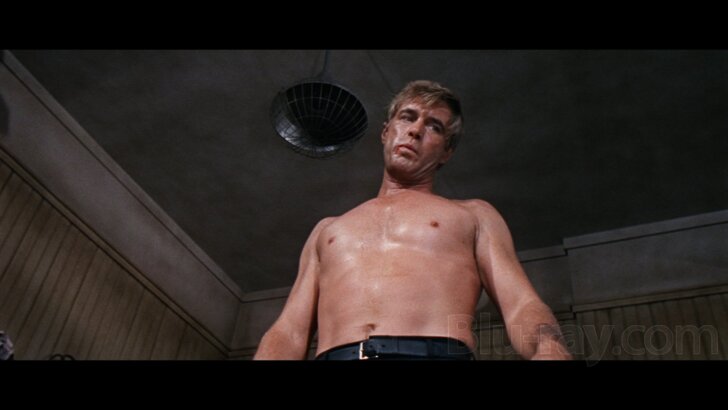
The last man standing gets the job
Why did Universal never bother to release John Guillerminís thriller P.J. on home video? I like the answer critics Howard S. Berger and Steve Mitchell offer in their audio commentary because it is exactly what I figured as soon as its final credits rolled on my screen. A long time ago, someone powerful, or a couple of similar people, at Universal concluded that it was too bad. No, not that kind of a poor and disappointing film, rather one that was too uncivilized and too violent for the masses. Berger and Mitchell bring up the original trailer the studio cut for it and claim that it validates their answer, and I think that they are correct. The guy that narrates the trailer openly promises exactly that kind of badness, and the visuals tell the rest of the story. But there is even more, proving that Berger and Mitchell's claim is legit. When Universal prepared P.J. for TV, someone did a lot of hard work to ensure that the masses see a properly sanitized version of the film. Berger and Mitchell even identify some of the exact visuals that were removed from the edited version that ended up on TV.
There is a lot that I like about P.J., but before I identify its strengths, I wish to clarify something so that if you decide to see it, you can approach it with realistic expectations. P.J. is not a genuinely controversial film. It does not break any genre boundaries, either. The main reason why Universal shelved it is its attitude -- it is an Ďanything goesí attitude, which frees the two sexes to go as hard at each other as needed. There are many earlier film noirs that have the exact same attitude, and plenty that go much further.
Private eye P.J. Detweiler (George Pepard) is hired by aging businessman William Orbison (Raymond Burr) to be the personal bodyguard of his much younger mistress Maureen Preble (Gayle Hunnicutt) because someone has been sending her anonymous letters warning that she will get killed. The businessman is still officially involved with his wife, Betty (Coleen Gray), but no one suspects that she could be responsible for the drama.
Shortly after P.J. begins escorting Maureen, however, someone fires a gun in her posh bedroom at the Orbison estate. Because P.J. fails to catch the attacker, the old man orders the entire family to temporarily relocate to the West Indies, where his company has started working on different projects with the local authorities and is quickly growing. Here, after a lavish party, someone kills the old manís business partner (Jason Evers) and P.J. becomes a suspect. While assisting the local investigators led by inspector Waterpark (Brock Peters) P.J. realizes that he has been set up, and when he eventually returns to New York goes to work to find out why.
The success of Harper was almost certainly what convinced the top brass at Universal to finance P.J., but in terms of attitude, this film has a lot more in common with the likes of Out of the Past and 99 River Street. It is unapologetically direct and often even borderline primitive, oozing a special type of negative energy that can be, and probably was, rather intimidating. This negative energy, not the set-up and later on the progression of the P.J.ís investigation, is what produces all the variety and excitement in the film because it evens the playing field for the different characters, and by doing so makes the drama and fireworks quite unpredictable. The most shocking moment in the entire film, for instance, comes out of left field during a seemingly very ordinary scuffle between P.J. and a small-time villain in New York Cityís subway.
The exotic material isnít at odds with the negative energy, either. On the contrary, in the West Indies the film produces its strongest and most cynical evidence that the world P.J. belongs to is an irreparably corrupt place and those that have doubts that it is so are doomed to suffer. (In Robert Lynnís similarly themed thriller Code 7, Victim 5 Lex Barkerís detective lands in beautiful Cape Town to do a job for another wealthy businessman and soon after the exotic material completely overwhelms the narrative. Predictably, its authenticity suffers and the end result is just another B-grade James Bond copycat).
Peppard leads with authority, but there are quality contributions from the entire cast. Barrís unbridled meanness, for instance, is what will stick in the minds of many viewers that rediscover the film.
P.J. Blu-ray Movie, Video Quality 
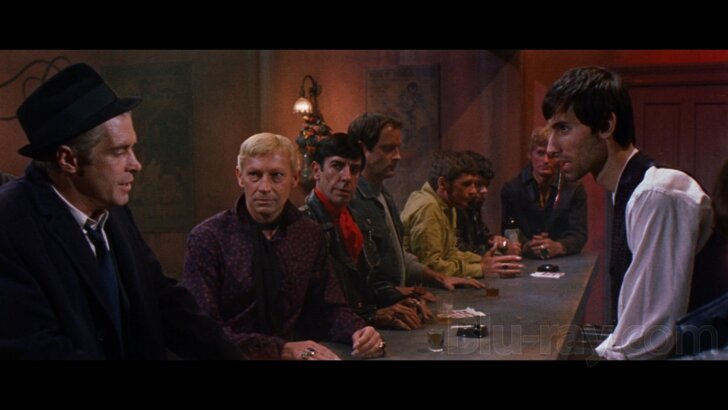
Presented in an aspect ratio of 2.35:1, encoded with MPEG-4 AVC and granted a 1080p transfer, P.J. arrives on Blu-ray courtesy of Imprint Films.
In 2020, we reviewed this release of P.J. from Kino Lober, which was sourced from a wonderful new 2K master. This Australian release is sourced from the same master.
I like this master a lot. There is a little bit of room for improvement -- some minor cosmetic work can be done and ideally density levels and the overall dynamic range of the visual can be better -- but the entire film has a very healthy and attractive organic appearance. Color balance is very convincing too, though after revisiting the film last night, I am convinced that in native 4K it will likely be a genuine stunner. Grain exposure is very good, but on this release some encoding optimizations could be helpful. Image stability is very good. All in all, I think P.J. looks very good on Blu-ray, and if you upscale it to 4K, it frequently produces seriously impressive visuals as well. My score is 4.25/5.00. (Note: This is a Region-Free Blu-ray release. Therefore, you will be able to play it on your player regardless of your geographical location).
P.J. Blu-ray Movie, Audio Quality 
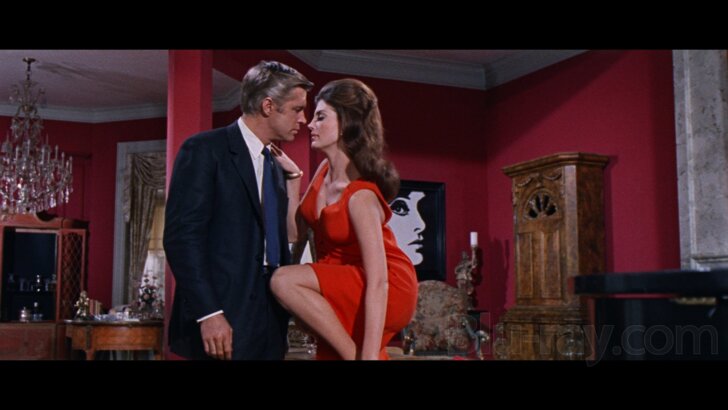
There is only one standard audio track on this Blu-ray release: LPCM 2.0. Optional English SDH subtitles are provided for the main feature. When turned on, they split the image frame and the black bar below it.
The audio is free of age-related anomalies. All exchanges are very clear, sharp, and stable. The film has a wonderful jazzy score that produces plenty of effective dynamic contrasts as well. On the other hand, while there is plenty of action footage, you should not expect to be impressed because it has various native limitations. There are no encoding anomalies to report in our review.
P.J. Blu-ray Movie, Special Features and Extras 
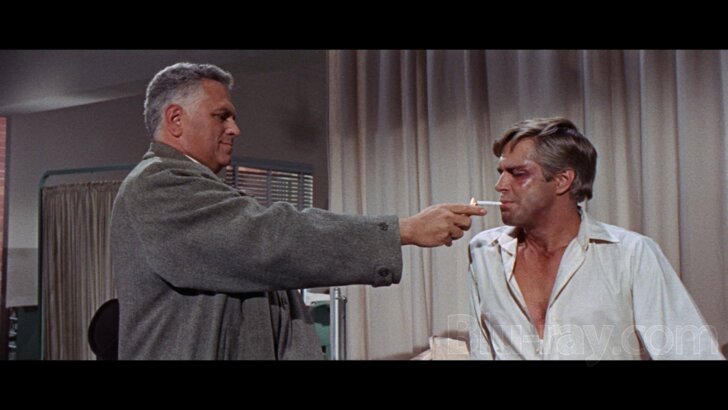
- A Man of Many Phases: The Early Years of John Guillermin - in this exclusive new program, screenwriter and film historian C. Courtney Joyner provides an excellent overview of John Guillermin's career and cinematic legacy and highlights some of the special qualities of his films.Also, there are some quite interesting comments about the British film industry after the end of WWII and its many ups and downs as well as the three films Guillermin made with John Peppard -- The Blue Max, P.J., and House of Cards. In English, not subtitled. (21 min).
- Commentary One - this exclusive new audio commentary was recorded by film historian and critic Toby Roan. It is a predictably excellent commentary that follows a familiar format. Mr. Roan provides plenty of interesting information about John Guillermin and the various actors that made P.J. with him. Also, there are interesting comments about the history of the film and Universal's treatment of it, as well as its newly acquired reputation as a cult classic.
- Commentary Two - a predictably great and very informative audio commentary recorded by critics Howard S. Berger and Steve Mitchell. There is a wealth of information in it about Universal's handling of P.J., its reputation as an ignored cult classic, the casting choices, the film's tolerance for violence/abuse/sexual tension, the evolution of the 'private eye' genre and the era in which the film emerged, etc. Great commentary.
- Image Gallery - a collection of vintage promotional materials for P.J. With music. (3 min).
P.J. Blu-ray Movie, Overall Score and Recommendation 

C. Courtney Joyner declares that some of John Guillermin's best work can be discovered in his three collaborations with George Peppard, and he is one hundred percent correct. If I had to pick the most impressive of the three, I would go with P.J., a first-class noirish crime thriller with a macho attitude that feels borderline controversial now. Needless to say, I am very happy to see that the recent 2K restoration of P.J. is introduced to collectors outside of North America. This release from Imprint Films also has two terrific exclusive new programs. It is included in Film Focus: George Peppard, a four-disc box set. VERY HIGHLY RECOMMENDED.
Similar titles
Similar titles you might also like
(Still not reliable for this title)

Detective Story
1951

Blue Steel
1990

Dirty Pretty Things
2002

The Garment Jungle
1957

The Big Clock
1948

House of Cards
Imprint #98
1968

The List of Adrian Messenger
Hollywood Gold Series
1963

Warning Shot
Imprint #177
1967

State of Grace
1990

The Brotherhood
Imprint #119
1968

The Limey
Blu-ray + Webstore Exclusive O-Ring
1999

13 West Street
1962

The Ipcress File
1965

The Wild One
1953

The Gambler
Imprint #49
1974

Hit!
1973

The Chalk Garden
Imprint #43
1964